Fact Sheet: Counselling Components and Therapeutic Relationship
VerifiedAdded on 2022/08/13
|5
|1438
|16
Practical Assignment
AI Summary
This fact sheet provides an overview of counselling, focusing on the humanistic and technical components essential for effective practice. It begins by highlighting the prevalence of mental health issues among school students and young adults, emphasizing the need for a supportive framework. The fact sheet then delves into the ethics of the client-counsellor relationship, emphasizing the importance of trust, confidentiality, and a non-judgmental approach. It outlines the school counsellor's responsibilities, including informed consent and adherence to ethical codes. The technical components of counselling, such as respect and the negotiation of a working alliance, are also discussed. Respect is presented as a crucial element for effective communication, while the working alliance is explored as a collaborative process involving the client, counsellor, and potentially parents and teachers, to achieve therapeutic goals. The fact sheet uses various psychological models and research to support its claims.
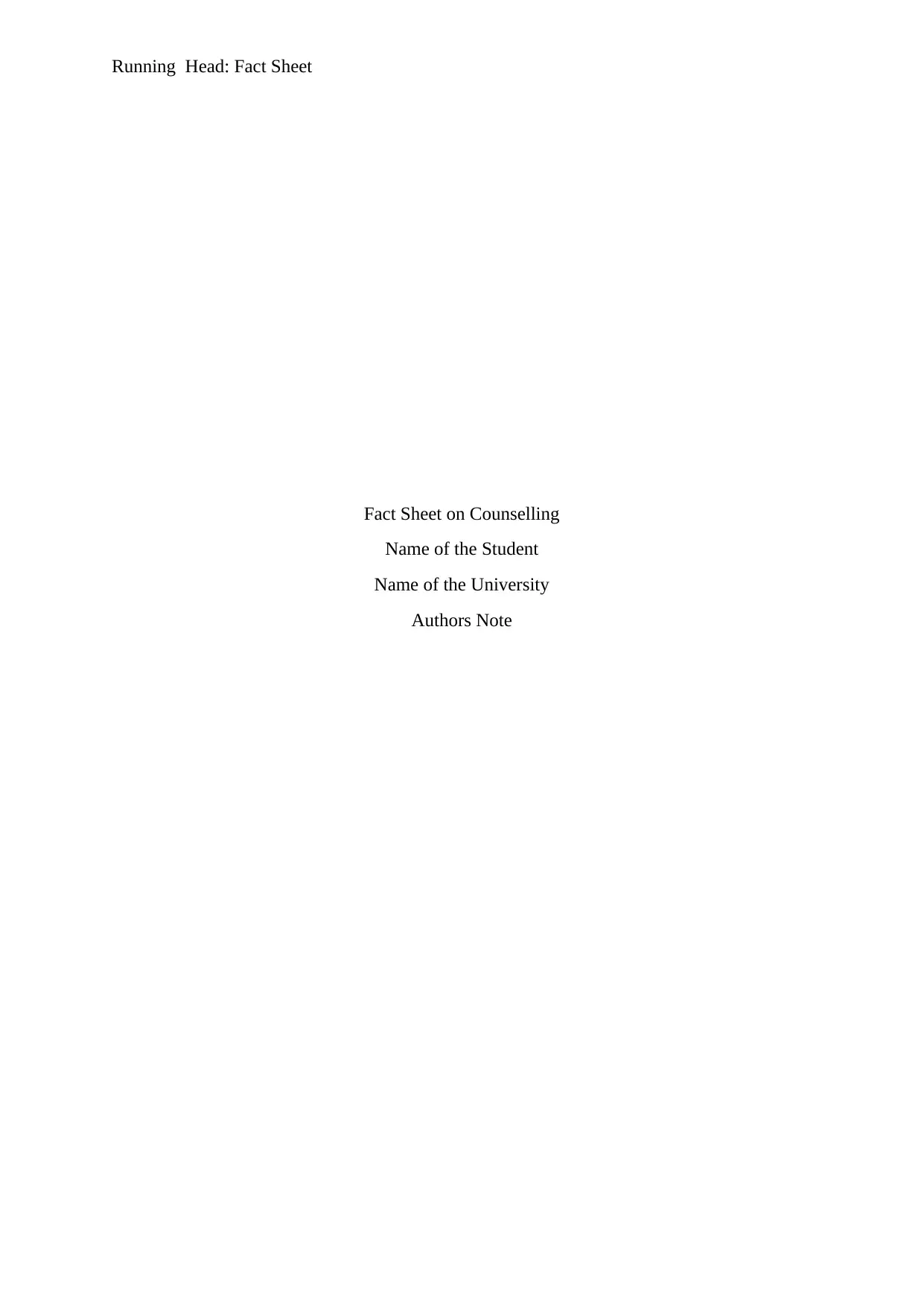
Running Head: Fact Sheet
Fact Sheet on Counselling
Name of the Student
Name of the University
Authors Note
Fact Sheet on Counselling
Name of the Student
Name of the University
Authors Note
Paraphrase This Document
Need a fresh take? Get an instant paraphrase of this document with our AI Paraphraser
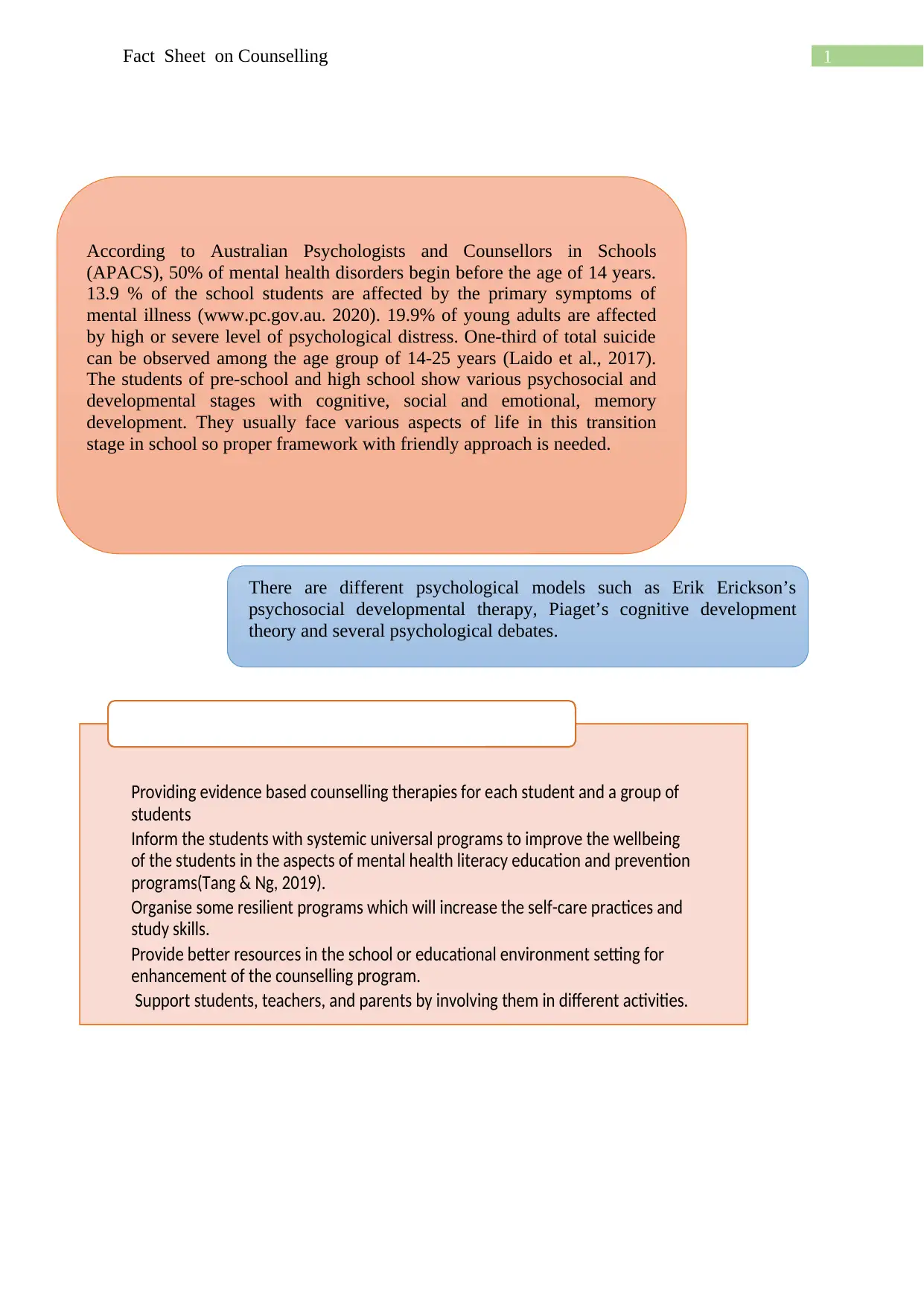
1Fact Sheet on Counselling
According to Australian Psychologists and Counsellors in Schools
(APACS), 50% of mental health disorders begin before the age of 14 years.
13.9 % of the school students are affected by the primary symptoms of
mental illness (www.pc.gov.au. 2020). 19.9% of young adults are affected
by high or severe level of psychological distress. One-third of total suicide
can be observed among the age group of 14-25 years (Laido et al., 2017).
The students of pre-school and high school show various psychosocial and
developmental stages with cognitive, social and emotional, memory
development. They usually face various aspects of life in this transition
stage in school so proper framework with friendly approach is needed.
There are different psychological models such as Erik Erickson’s
psychosocial developmental therapy, Piaget’s cognitive development
theory and several psychological debates.
Providing evidence based counselling therapies for each student and a group of
students
Inform the students with systemic universal programs to improve the wellbeing
of the students in the aspects of mental health literacy education and prevention
programs(Tang & Ng, 2019).
Organise some resilient programs which will increase the self-care practices and
study skills.
Provide better resources in the school or educational environment setting for
enhancement of the counselling program.
Support students, teachers, and parents by involving them in different activities.
As a counsellor several duties should be executed such as
According to Australian Psychologists and Counsellors in Schools
(APACS), 50% of mental health disorders begin before the age of 14 years.
13.9 % of the school students are affected by the primary symptoms of
mental illness (www.pc.gov.au. 2020). 19.9% of young adults are affected
by high or severe level of psychological distress. One-third of total suicide
can be observed among the age group of 14-25 years (Laido et al., 2017).
The students of pre-school and high school show various psychosocial and
developmental stages with cognitive, social and emotional, memory
development. They usually face various aspects of life in this transition
stage in school so proper framework with friendly approach is needed.
There are different psychological models such as Erik Erickson’s
psychosocial developmental therapy, Piaget’s cognitive development
theory and several psychological debates.
Providing evidence based counselling therapies for each student and a group of
students
Inform the students with systemic universal programs to improve the wellbeing
of the students in the aspects of mental health literacy education and prevention
programs(Tang & Ng, 2019).
Organise some resilient programs which will increase the self-care practices and
study skills.
Provide better resources in the school or educational environment setting for
enhancement of the counselling program.
Support students, teachers, and parents by involving them in different activities.
As a counsellor several duties should be executed such as
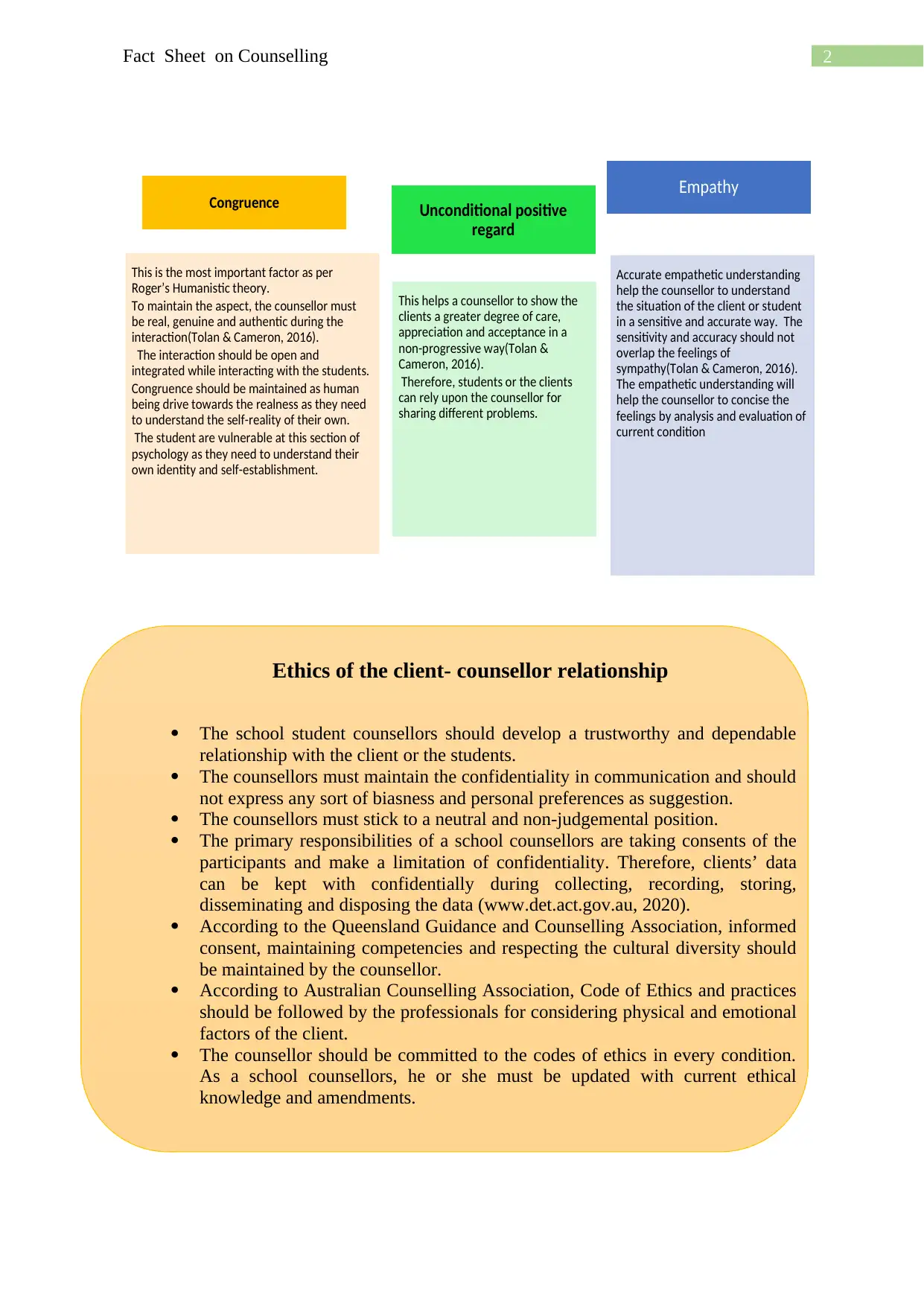
2Fact Sheet on Counselling
Congruence
This is the most important factor as per
Roger’s Humanistic theory.
To maintain the aspect, the counsellor must
be real, genuine and authentic during the
interaction(Tolan & Cameron, 2016).
The interaction should be open and
integrated while interacting with the students.
Congruence should be maintained as human
being drive towards the realness as they need
to understand the self-reality of their own.
The student are vulnerable at this section of
psychology as they need to understand their
own identity and self-establishment.
Unconditional positive
regard
This helps a counsellor to show the
clients a greater degree of care,
appreciation and acceptance in a
non-progressive way(Tolan &
Cameron, 2016).
Therefore, students or the clients
can rely upon the counsellor for
sharing different problems.
Empathy
Accurate empathetic understanding
help the counsellor to understand
the situation of the client or student
in a sensitive and accurate way. The
sensitivity and accuracy should not
overlap the feelings of
sympathy(Tolan & Cameron, 2016).
The empathetic understanding will
help the counsellor to concise the
feelings by analysis and evaluation of
current condition
Ethics of the client- counsellor relationship
The school student counsellors should develop a trustworthy and dependable
relationship with the client or the students.
The counsellors must maintain the confidentiality in communication and should
not express any sort of biasness and personal preferences as suggestion.
The counsellors must stick to a neutral and non-judgemental position.
The primary responsibilities of a school counsellors are taking consents of the
participants and make a limitation of confidentiality. Therefore, clients’ data
can be kept with confidentially during collecting, recording, storing,
disseminating and disposing the data (www.det.act.gov.au, 2020).
According to the Queensland Guidance and Counselling Association, informed
consent, maintaining competencies and respecting the cultural diversity should
be maintained by the counsellor.
According to Australian Counselling Association, Code of Ethics and practices
should be followed by the professionals for considering physical and emotional
factors of the client.
The counsellor should be committed to the codes of ethics in every condition.
As a school counsellors, he or she must be updated with current ethical
knowledge and amendments.
Congruence
This is the most important factor as per
Roger’s Humanistic theory.
To maintain the aspect, the counsellor must
be real, genuine and authentic during the
interaction(Tolan & Cameron, 2016).
The interaction should be open and
integrated while interacting with the students.
Congruence should be maintained as human
being drive towards the realness as they need
to understand the self-reality of their own.
The student are vulnerable at this section of
psychology as they need to understand their
own identity and self-establishment.
Unconditional positive
regard
This helps a counsellor to show the
clients a greater degree of care,
appreciation and acceptance in a
non-progressive way(Tolan &
Cameron, 2016).
Therefore, students or the clients
can rely upon the counsellor for
sharing different problems.
Empathy
Accurate empathetic understanding
help the counsellor to understand
the situation of the client or student
in a sensitive and accurate way. The
sensitivity and accuracy should not
overlap the feelings of
sympathy(Tolan & Cameron, 2016).
The empathetic understanding will
help the counsellor to concise the
feelings by analysis and evaluation of
current condition
Ethics of the client- counsellor relationship
The school student counsellors should develop a trustworthy and dependable
relationship with the client or the students.
The counsellors must maintain the confidentiality in communication and should
not express any sort of biasness and personal preferences as suggestion.
The counsellors must stick to a neutral and non-judgemental position.
The primary responsibilities of a school counsellors are taking consents of the
participants and make a limitation of confidentiality. Therefore, clients’ data
can be kept with confidentially during collecting, recording, storing,
disseminating and disposing the data (www.det.act.gov.au, 2020).
According to the Queensland Guidance and Counselling Association, informed
consent, maintaining competencies and respecting the cultural diversity should
be maintained by the counsellor.
According to Australian Counselling Association, Code of Ethics and practices
should be followed by the professionals for considering physical and emotional
factors of the client.
The counsellor should be committed to the codes of ethics in every condition.
As a school counsellors, he or she must be updated with current ethical
knowledge and amendments.
⊘ This is a preview!⊘
Do you want full access?
Subscribe today to unlock all pages.

Trusted by 1+ million students worldwide
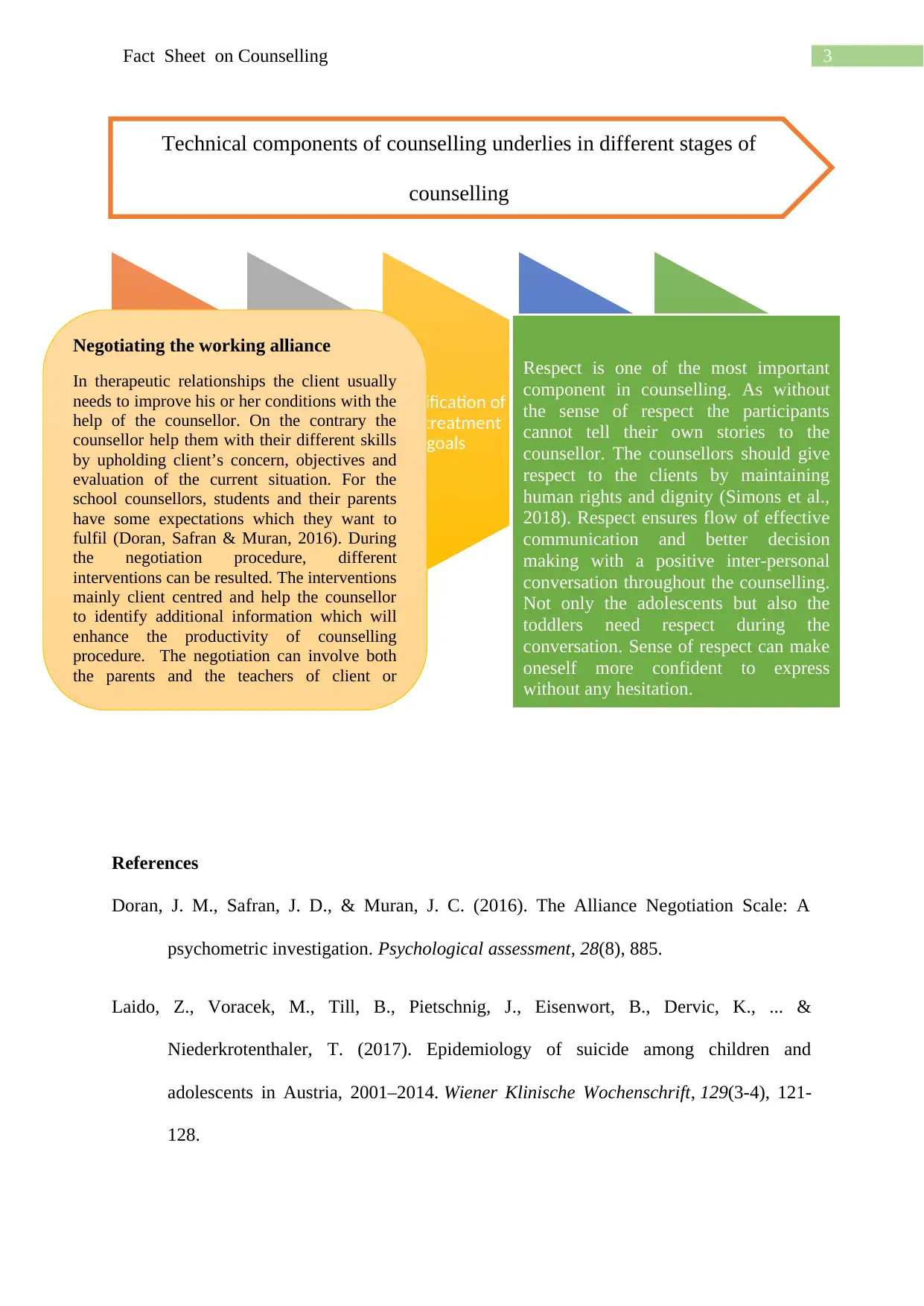
3Fact Sheet on Counselling
References
Doran, J. M., Safran, J. D., & Muran, J. C. (2016). The Alliance Negotiation Scale: A
psychometric investigation. Psychological assessment, 28(8), 885.
Laido, Z., Voracek, M., Till, B., Pietschnig, J., Eisenwort, B., Dervic, K., ... &
Niederkrotenthaler, T. (2017). Epidemiology of suicide among children and
adolescents in Austria, 2001–2014. Wiener Klinische Wochenschrift, 129(3-4), 121-
128.
client-
counsellor
relationship,
assessing the
problem
identification of
the treatment
goals
designing and
implementing
the
interventions
planning ,
termination and
follow-up
Technical components of counselling underlies in different stages of
counselling
Negotiating the working alliance
In therapeutic relationships the client usually
needs to improve his or her conditions with the
help of the counsellor. On the contrary the
counsellor help them with their different skills
by upholding client’s concern, objectives and
evaluation of the current situation. For the
school counsellors, students and their parents
have some expectations which they want to
fulfil (Doran, Safran & Muran, 2016). During
the negotiation procedure, different
interventions can be resulted. The interventions
mainly client centred and help the counsellor
to identify additional information which will
enhance the productivity of counselling
procedure. The negotiation can involve both
the parents and the teachers of client or
student.
Respect is one of the most important
component in counselling. As without
the sense of respect the participants
cannot tell their own stories to the
counsellor. The counsellors should give
respect to the clients by maintaining
human rights and dignity (Simons et al.,
2018). Respect ensures flow of effective
communication and better decision
making with a positive inter-personal
conversation throughout the counselling.
Not only the adolescents but also the
toddlers need respect during the
conversation. Sense of respect can make
oneself more confident to express
without any hesitation.
References
Doran, J. M., Safran, J. D., & Muran, J. C. (2016). The Alliance Negotiation Scale: A
psychometric investigation. Psychological assessment, 28(8), 885.
Laido, Z., Voracek, M., Till, B., Pietschnig, J., Eisenwort, B., Dervic, K., ... &
Niederkrotenthaler, T. (2017). Epidemiology of suicide among children and
adolescents in Austria, 2001–2014. Wiener Klinische Wochenschrift, 129(3-4), 121-
128.
client-
counsellor
relationship,
assessing the
problem
identification of
the treatment
goals
designing and
implementing
the
interventions
planning ,
termination and
follow-up
Technical components of counselling underlies in different stages of
counselling
Negotiating the working alliance
In therapeutic relationships the client usually
needs to improve his or her conditions with the
help of the counsellor. On the contrary the
counsellor help them with their different skills
by upholding client’s concern, objectives and
evaluation of the current situation. For the
school counsellors, students and their parents
have some expectations which they want to
fulfil (Doran, Safran & Muran, 2016). During
the negotiation procedure, different
interventions can be resulted. The interventions
mainly client centred and help the counsellor
to identify additional information which will
enhance the productivity of counselling
procedure. The negotiation can involve both
the parents and the teachers of client or
student.
Respect is one of the most important
component in counselling. As without
the sense of respect the participants
cannot tell their own stories to the
counsellor. The counsellors should give
respect to the clients by maintaining
human rights and dignity (Simons et al.,
2018). Respect ensures flow of effective
communication and better decision
making with a positive inter-personal
conversation throughout the counselling.
Not only the adolescents but also the
toddlers need respect during the
conversation. Sense of respect can make
oneself more confident to express
without any hesitation.
Paraphrase This Document
Need a fresh take? Get an instant paraphrase of this document with our AI Paraphraser
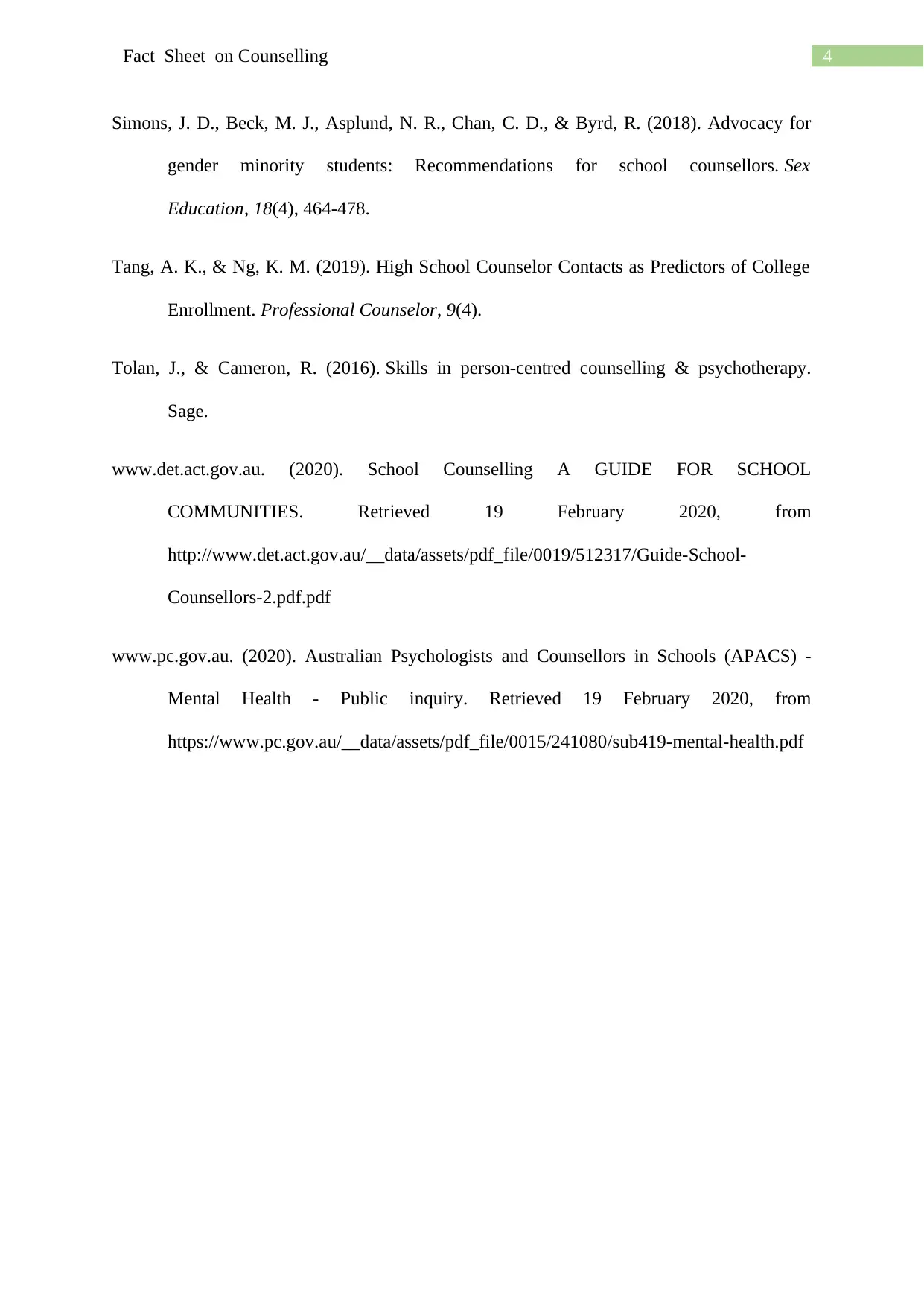
4Fact Sheet on Counselling
Simons, J. D., Beck, M. J., Asplund, N. R., Chan, C. D., & Byrd, R. (2018). Advocacy for
gender minority students: Recommendations for school counsellors. Sex
Education, 18(4), 464-478.
Tang, A. K., & Ng, K. M. (2019). High School Counselor Contacts as Predictors of College
Enrollment. Professional Counselor, 9(4).
Tolan, J., & Cameron, R. (2016). Skills in person-centred counselling & psychotherapy.
Sage.
www.det.act.gov.au. (2020). School Counselling A GUIDE FOR SCHOOL
COMMUNITIES. Retrieved 19 February 2020, from
http://www.det.act.gov.au/__data/assets/pdf_file/0019/512317/Guide-School-
Counsellors-2.pdf.pdf
www.pc.gov.au. (2020). Australian Psychologists and Counsellors in Schools (APACS) -
Mental Health - Public inquiry. Retrieved 19 February 2020, from
https://www.pc.gov.au/__data/assets/pdf_file/0015/241080/sub419-mental-health.pdf
Simons, J. D., Beck, M. J., Asplund, N. R., Chan, C. D., & Byrd, R. (2018). Advocacy for
gender minority students: Recommendations for school counsellors. Sex
Education, 18(4), 464-478.
Tang, A. K., & Ng, K. M. (2019). High School Counselor Contacts as Predictors of College
Enrollment. Professional Counselor, 9(4).
Tolan, J., & Cameron, R. (2016). Skills in person-centred counselling & psychotherapy.
Sage.
www.det.act.gov.au. (2020). School Counselling A GUIDE FOR SCHOOL
COMMUNITIES. Retrieved 19 February 2020, from
http://www.det.act.gov.au/__data/assets/pdf_file/0019/512317/Guide-School-
Counsellors-2.pdf.pdf
www.pc.gov.au. (2020). Australian Psychologists and Counsellors in Schools (APACS) -
Mental Health - Public inquiry. Retrieved 19 February 2020, from
https://www.pc.gov.au/__data/assets/pdf_file/0015/241080/sub419-mental-health.pdf
1 out of 5
Your All-in-One AI-Powered Toolkit for Academic Success.
+13062052269
info@desklib.com
Available 24*7 on WhatsApp / Email
![[object Object]](/_next/static/media/star-bottom.7253800d.svg)
Unlock your academic potential
Copyright © 2020–2026 A2Z Services. All Rights Reserved. Developed and managed by ZUCOL.

